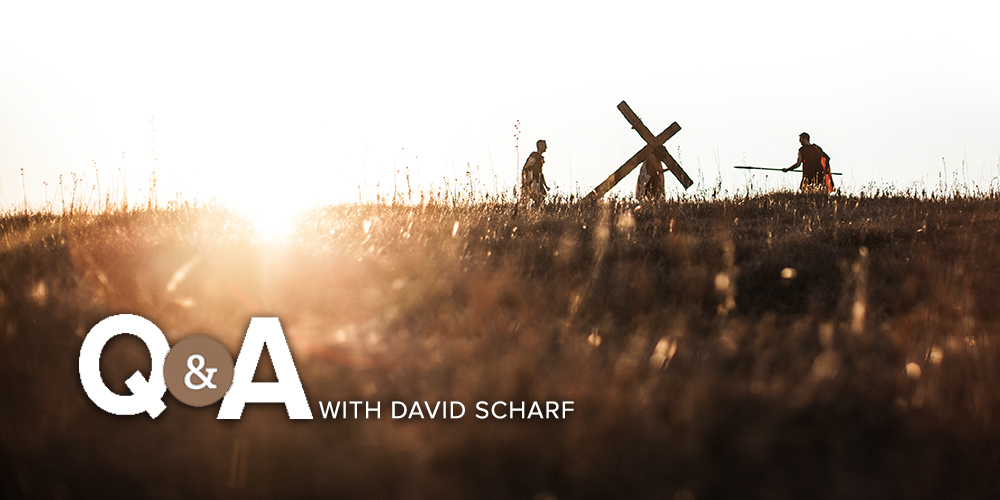 |
Jesus had just handed the crossbeam to Simon of Cyrene who would carry it the rest of the way to the site of crucifixion. Noticing the women who were wailing along the route, he said, “Daughters of Jerusalem, do not weep for me; weep for yourselves and for your children. For the time will come when you will say, ‘Blessed are the childless women, the wombs that never bore and the breasts that never nursed!’ Then they will say to the mountains, ‘Fall on us!’ and to the hills, ‘Cover us!’ For if people do these things when the tree is green, what will happen when it is dry?” (Luke 23:28-31).
An innocent man was marching toward a horrendous death on a cross, and all who saw him knew he was a dead man walking. How could the women not weep? In a sense, Jesus is saying here, “Just you wait.”
The fulfillment
April A.D. 70. Visitors from around the world had gathered in Jerusalem for the Passover. Then the Romans besieged the city, trapping the visitors and inhabitants inside. Food and water supplies were scarce. The siege lasted 143 days.
Much of our information about this siege of Jerusalem comes from the Jewish historian, Josephus, who lived through the event. Normally, being without children was looked at shamefully in Jesus’ day, but Josephus offers a chilling illustration of Jesus’ words: “Blessed are the childless women.” The historian described a wealthy woman named Mary, daughter of Eleazor. The incident is so horrible it’s difficult to write about. She was so desperate for food that she resorted to cannibalizing her own child. It even horrified the soldiers.
When the Roman armies burst into the city in August of A.D. 70, they killed nearly every person. Josephus records that over one million were slaughtered.
It’s no wonder Jesus quotes Hosea 10:8, “Then they will say to the mountains, ‘Cover us!’ and to the hills, ‘Fall on us!’ ” Hosea described the horrendous conditions of Assyria conquering the Northern Kingdom of Israel in 722 B.C. It would be so terrible people would rather be crushed by the hills than endure the horror.
As bad as the fall of Jerusalem in A.D. 70 was, just you wait. The words of Hosea for 722 B.C. would not only be echoed in Jerusalem in A.D. 70 but will be experienced again when Jesus appears on the Last Day. On that day, the horror of God’s wrath on unbelievers will reach its culmination. They too will “[call] to the mountains and the rocks, ‘Fall on us and hide us from the face of him who sits on the throne and from the wrath of the Lamb!’ ” (Revelation 6:16). Like Adam and Eve in the garden, they will want to be hidden from God. To the enemies of the gospel, to the unrepentant, to the unbelieving, Jesus will say the most horrible words in all of Scripture: “Depart from me, you who are cursed, into the eternal fire prepared for the devil and his angels” (Matthew 25:41).
What it means for you
Can you see why Jesus said, “Do not weep for me; weep for yourselves and for your children”? This is what awaits those who reject Jesus’ work. But what does it mean for us?
Don’t be a spectator at the cross as you take your Lenten journey. When you turn on the news, you often will see suffering. People lose their homes and loved ones after a natural disaster. People suffer atrocities in war-torn countries. People suffer injustice. We weep for those people, but we don’t weep for ourselves because we are not experiencing those things. As we walk with Jesus, we need to realize that this is not just another senseless death. When Jesus comes again, all those who are unprepared and unrepentant are the dead men walking. Jesus’ death is about us. It frees us from his punishment and judgment.
Don’t feel sorry for Jesus; feel sorry for your sin. Jesus does not want our sympathy; he wants our repentance. Imagine that every time you sin, a loved one must endure a whipping. Every mistake you make results in pain for your loved one. After a lifetime, how many whippings would that be? At the end of your life, would you say to that person, “I feel so sorry for you”? No, you would plead with that person, “Can you ever forgive me?” Again, Jesus does not want our sympathy; he wants our repentance. He has been whipped and beaten for us.
Recognize that this life is your time of grace. Jesus says, “For if people do these things when the tree is green, what will happen when it is dry?” Jesus, the Innocent One, is the green tree. Those who reject him are the dry tree. Their rejection and sin provoke the flames like gasoline on dry wood. Jesus is saying that if God allows this to happen to Jesus who suffers for us, how much more will those who reject Jesus suffer? Our lives are a time of grace to come to know Jesus and repent. The Last Day is coming when God’s patience will run out. God has punished his Son for all the sinners of the world. He is patient with us all now so we might believe and serve him.
Don’t miss the gospel
The path Jesus is walking has been termed by the church the Via Dolorosa, the Way of Sorrows. However, understand that Jesus saw it as the Via Gaudia, the Way of Joy.
What do I mean? The writer to the Hebrews says, “Let us run with perseverance the race marked out for us, fixing our eyes on Jesus. . . . For the joy set before him he endured the cross, scorning its shame” (12:1,2). Only one joy could have gotten Jesus to endure what he did and finish his race with that torturous death on a cross. Do you know what that joy was? Simply, you. His eyes were fixed on you every step of his life, and that life did not ultimately end at a cross but with the glory of the empty tomb. His joy was the salvation of every sinner, including you. And now, he stands with your crown in his hand—the one he crafted with his perfect life, colored with his innocent blood, and sparkled with the glory of his resurrection. Yes, focus on that and you will rejoice.
As Jesus looked down from the cross, he saw people who snarled at him and mocked him. As he looked to his left and to his right, he was even belittled by the those hanging on the crosses next to him. And yet, in his greatest act of strength, he stayed. He offered a crown to one of those crucified with him. He stayed on the cross for him, for you, and for me. So repent and then rejoice, because Jesus rejoices over you. The same cross that proclaims, “Your sins put Jesus there,” now proclaims, “Your sins are forgiven.”
Have a question, ask it here!
Author: David Scharf
Volume 109, Number 03
Issue: March 2022
- Q&A: What would Jesus think about all the different Christian denominations?
- Q&A: Are there times when it is okay to lie?
- Q&A: What advice does the Bible have for single people?
- Q&A: How do I know I am elected by God?
- Q&A: Why is Pontius Pilate immortalized in our creeds?
- Q&A: How does remembering my baptism help with the guilt I carry?
- Q&A: Do parts of the Bible teach works righteousness?
- Q&A: How can I overcome my struggle with lust and pornography?
- Q&A: How should I help my child struggling with same-sex attraction?
- Q&A: Should Christians pray to saints?
- Q&A: Is anger sinful?
- Q&A: How can parents encourage adult children who wander from the faith?
- Q&A: Does the doxology belong in the Lord’s Prayer?
- Q&A: Is God fair?
- Q&A: When we pray, “Your kingdom come,” what are we praying for?
- Q&A: How can I better manage what God has given me this year so that I glorify him?
- Q&A: What are ways to glorify God besides singing in church?
- Q&A: I have no special gifts, and I mess up all the time. Does God really need me?
- Q&A: How do I overcome the feeling that my life has no purpose and I don’t make a difference?
- Q&A: My friend died and was not a professing Christian. What do I say to the family?
- Q&A: How can my mother and I forgive my father for being unfaithful and causing my parents to divorce?
- Q&A: Why were demon possession, gifts of healing, and gifts of tongues more prevalent in biblical times?
- Q&A: Is Christianity the only religion that gives the certainty of heaven?
- Q&A: If people go to hell, isn’t it their fault because God gave them free will and they rejected him?
- Q&A: Why are the 40 days between Jesus’ resurrection and his ascension important for the disciples and for us?
- Q&A: Can you explain Jesus’ words to the wailing women he met on his way to be crucified?
- Q&A: What if spouses don’t “love” each other anymore?
- Q&A: Is it wrong to have a cross with Jesus’ body on it?
- Q&A: Is our time of grace really unchangeable?
- Q&A: I know that we are saved by grace apart from works, but how can it be that easy?
- Q&A: Are there degrees of glory in heaven as a reward for good works?
- Q&A: Do Lutherans take the Bible literally and teach millennialism?
- Q&A: Are there different interpretations of the Bible?
- Q&A: How can we be sure the Bible includes what God originally gave us?
- Q&A: Why does it seem like Christianity is so negative?
- Q&A: How can I explain how Jesus’ resurrection is possible and if the Bible is reliable?
- Q&A: Is it okay to live together if we are planning to get married?
- Q&A: How is the Bible God’s Word?
- Q&A: Were we “created to make a difference”?
- Q&A: Am I being judgmental if I point out someone’s sin?
- Q&A: Do I need to read the Bible to have a relationship with God?
- Q&A: Can a Christian vote for a political candidate who supports abortion?
- Q&A: Does God really care?
- Q&A: Does it really matter how God made the world?
- Q&A: Does God send people to hell?
- Q&A: Is death natural?
- Q&A: How can I forgive and forget?
- Q&A: Does God help those who help themselves?
- Q&A: How can we say that the Old Testament God is the same as the New Testament God?
- Q&A: Is Jesus the only way to get to heaven?
- Q&A: Doesn’t God want me to be happy?
- Light for our path: Does God hate us?
- Light for our path: What kind of comfort can you give someone when a loved one commits suicide?
- Light for our path: What does a submissive wife in a Christian marriage look like?
- Light for our path: Is it a sin to want to die from a terminal illness?
- Light for our path: What advice can you give about applauding in church?
- Light for our path: Can you please explain Matthew 5:20?
- Light for our path: What is karma?
- Light for our path: Can the devil personally be tempting me and a lot of other people at exactly the same time?
- Light for our path: Does the word Easter refer to Ishtar, the Babylonian fertility goddess?
- Light for our path: What role does emotion play in contrition?
- Light for our path: What does the white stone in Revelation 2:17 mean?
- Light for our path: Is the cross symbol now anti-Christian?
- Light for our path: Were Joseph and Mary engaged or married when Joseph learned of Mary’s pregnancy?





